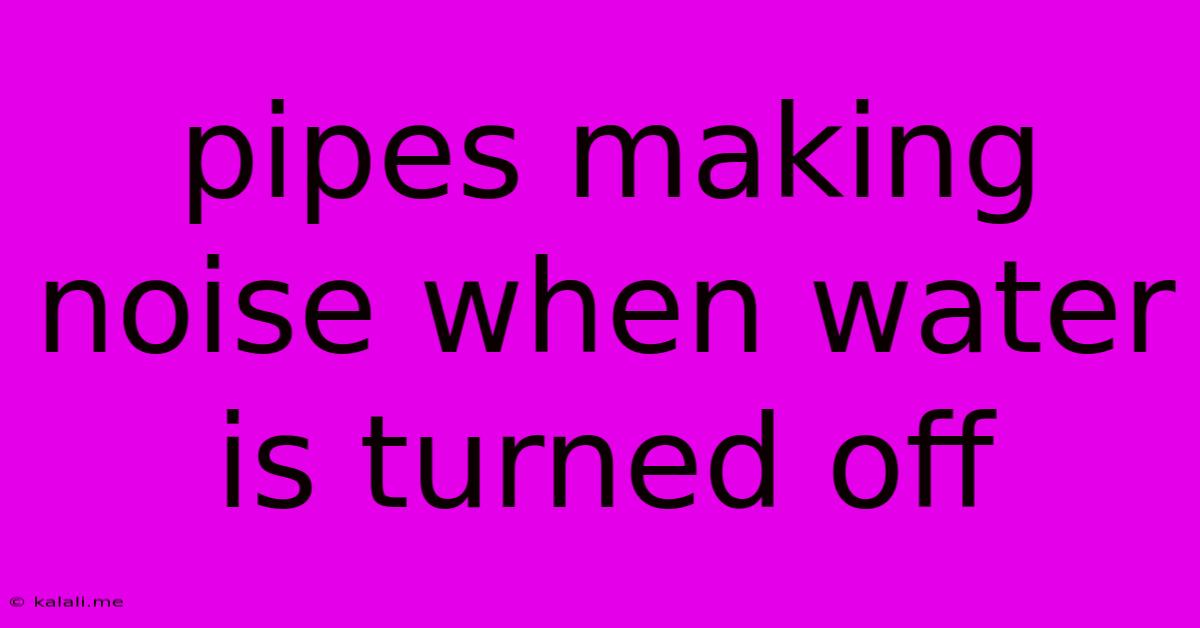Pipes Making Noise When Water Is Turned Off
Kalali
May 20, 2025 · 3 min read

Table of Contents
The Mystery of the Noisy Pipes: Why Your Pipes Bang When the Water's Off
Have you ever experienced that unsettling bang or clanging sound coming from your pipes after you turn off the water? It's a common plumbing problem that can be more than just annoying – it can signal underlying issues that need addressing. This article will explore the common culprits behind this noisy phenomenon, offering solutions to help you silence those disruptive pipes. Understanding the cause is the first step to a quieter home.
Common Causes of Water Hammer in Pipes
The most frequent reason for pipes making noise when the water is turned off is water hammer. This occurs when the fast-moving water in your pipes suddenly stops. The inertia of the water creates a pressure surge, causing the pipes to vibrate and bang against surrounding structures. Imagine a train suddenly braking – that's essentially what's happening inside your pipes. Several factors contribute to water hammer:
- Sudden Water Stoppage: The quicker the water is shut off, the more likely water hammer is to occur. Older faucets and valves that close abruptly are prime suspects.
- Lack of Air Chambers: Air chambers are small pockets of air installed in your plumbing system. Their purpose is to absorb the pressure surges caused by water hammer. If these chambers are filled with water (due to leaks or age), they become ineffective.
- Loose Pipes: Pipes that are not properly secured can rattle and amplify the noise of water hammer. This is especially true in older homes with aging plumbing systems.
- High Water Pressure: Excessively high water pressure in your system can exacerbate the impact of water hammer, leading to more forceful banging.
- Long Pipe Runs: Longer stretches of pipes without any breaks or pressure-relief devices are more susceptible to water hammer effects.
Diagnosing the Source of the Noise
Before you start troubleshooting, try to pinpoint the location of the noise. This will help you narrow down the possible causes. Pay attention to:
- The timing of the noise: Does it happen immediately after turning off the water, or is there a delay?
- The intensity of the noise: Is it a gentle thump or a loud bang?
- The location of the noise: Can you pinpoint the exact area where the noise is originating?
Solutions to Silence Noisy Pipes
Once you've identified the potential cause, you can implement these solutions:
- Install Water Hammer Arrestors: These inexpensive devices are readily available at most hardware stores. They act as shock absorbers, preventing the pressure surges that cause water hammer. Installing them near faucets and appliances is crucial.
- Check and Repair Air Chambers: If you suspect your air chambers are the problem, inspect them for leaks or blockages. A plumber can assess and repair or replace them if necessary. Sometimes, simply opening a nearby faucet briefly can reintroduce air into a partially filled chamber.
- Secure Loose Pipes: If you find any loose pipes, tighten them securely to prevent rattling. You might need to use pipe straps or clamps for a more permanent solution.
- Reduce Water Pressure: If you have unusually high water pressure, contact your local water utility to check your pressure and see if it needs adjustment. A pressure regulator installed by a plumber can help maintain ideal water pressure.
- Replace Old Faucets and Valves: Outdated faucets and valves often close quickly, contributing to water hammer. Replacing them with modern, slow-closing valves can significantly reduce the problem.
When to Call a Plumber
While many water hammer issues are easily resolvable, some situations require the expertise of a qualified plumber:
- Persistent, loud banging: If the noise is severe or doesn’t improve after trying the above solutions.
- Suspected leaks: If you suspect a leak is contributing to the problem.
- Complex plumbing systems: If you're unsure about working with your plumbing system.
By understanding the causes of noisy pipes and implementing appropriate solutions, you can create a more peaceful and comfortable home environment. Remember, addressing the issue promptly not only reduces noise but also prevents potential damage to your plumbing system in the long run.
Latest Posts
Latest Posts
-
How You Like Them Apples Meaning
May 20, 2025
-
Gemma Arterton Clash Of The Titans
May 20, 2025
-
Hot Water Pressure Release Valve Leaking
May 20, 2025
-
How To Get Dog Hair Out Of The Washer
May 20, 2025
-
How To Put A Screen Protector On Without Air Bubbles
May 20, 2025
Related Post
Thank you for visiting our website which covers about Pipes Making Noise When Water Is Turned Off . We hope the information provided has been useful to you. Feel free to contact us if you have any questions or need further assistance. See you next time and don't miss to bookmark.